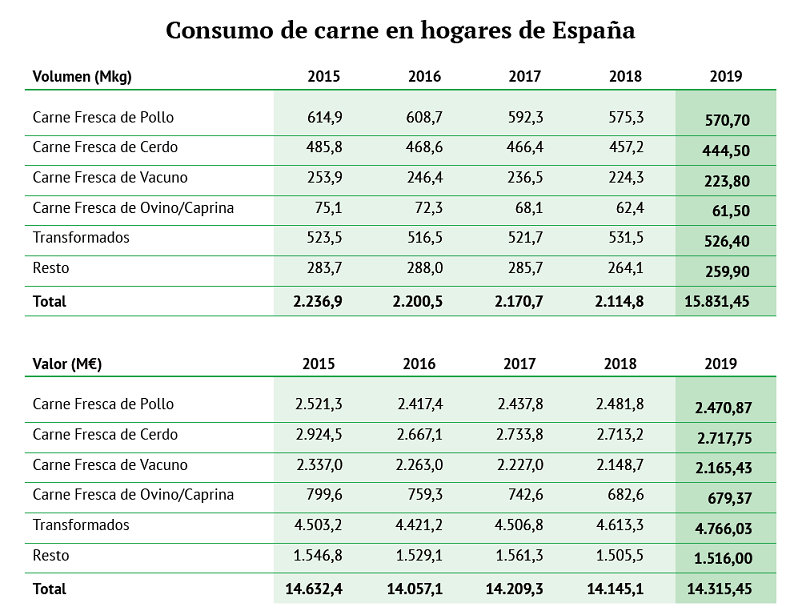- The sector is involved in investments of 600 million euros in the field of livestock production and 542 million in industries to move towards environmental neutrality and compliance with the Sustainable Development Goals.
- The plan includes 529 projects to reduce greenhouse gas emissions, 724 to reduce ammonia emissions, 220 focused on reducing emissions in transportation and another 110 investments on other aspects related to sustainability.
- Interprofessional organizations highlight the sector's firm commitment to reducing GHG emissions, especially methane emissions, betting on more efficient livestock management, the promotion of more balanced diets and the application of sustainability and digitalization criteria in production processes
MADRID, November 5, 2021
The Spanish livestock-meat sector is working in a coordinated manner to reduce greenhouse gas emissions by 30% (GHG) attributable to its activity, as part of its firm commitment to move towards environmental neutrality and compliance with the Sustainable Development Goals (SDG), as reported by the six interprofessional organizations in the sector, ASICI, AVIANZA, INTERCUN, INTEROVIC , INTERPORC and PROVACUNO, on the occasion of the COP26 Climate Change Summit, which is being held these days in Glasgow.
To achieve these reduction objectives, of which 50% correspond to methane reductions (in line with the "Global Commitment on Methane", promoted by the US and the European Union at COP26 and to which 100 countries have joined, The sector is involved in investments of 600 million euros in the field of animal production and some 542 million euros in the meat industries), which also include other objectives such as improving energy efficiency in industries and facilities. livestock, manure, manure and sewage sludge management operations, and livestock feeding and enteric fermentation,
This entire plan that is being developed to contribute to the solution to the climate change problems facing our planet is an important part of a strategic sectoral project linked to European funds, which will mobilize investments of more than 5,054 million euros to increase its environmental sustainability and its capacity for innovation, contributing to the recovery and economic transformation of our country.
1,689 companies and ranchers from all the Autonomous Communities participate in this project, of which 73.6% are SMEs, together with technological partners in the fields of the circular economy, renewable energies and digitalization.
The objective includes a total of 529 investment proposals related to the reduction of greenhouse gases, 724 proposals to reduce ammonia emissions at facilities, 220 proposals focused on reducing emissions in transportation and 110 on other aspects related to the sustainability.
Reduction of ammonia, water footprint and energy consumption
In addition to the ambitious objectives regarding the reduction of greenhouse gases, especially methane, the livestock-meat chain contemplates the reduction of ammonia emissions from the facilities of the sectors included in an average value of 28% together with a 6% in the industry.
Likewise, energy consumption in farms and meat industries will also be reduced by 38% and 22%, respectively, with the projects undertaken.
The water footprint per kilogram of final product will also be reduced by an average value of 18%, as a consequence of the reduction in water consumption after the automation and robotization of processes, the control of leaks and water escapes due to the modernization of facilities and water supply systems, as well as operations associated with the reuse and recovery of water for cleaning operations, supplying livestock or irrigating crops.
Finally, feed consumption will decrease by 15%, which will in turn lead to a reduction in GHG and ammonia emissions. And the consumption of other raw materials will also be reduced by 23% in livestock facilities and by 18% in meat industries.
The livestock-meat chain has always shown its commitment to contributing to the progress and development of Spanish society and its territory, as demonstrated by its ecosystem that generates employment, wealth, territorial structure, balanced and healthy diet and responsible consumption, in addition to its efforts to reduce the environmental impacts generated by its activity.
ASICI. The Interprofessional Association of the Iberian Pig brings together producers and processing industries of Iberian products.
AVIANZA. The Spanish Interprofessional Poultry Meat Association brings together both farms and production centers as well as cutting and processing plants.
INTERCUN. The Interprofessional Organization to promote the Rabbit Sector integrates representatives of the production branch and rabbit meat processing-marketing companies.
INTEROVIC. The Interprofessional Organization of Sheep and Goat Meat represents the producers of this livestock branch and the industrialists and marketers who generate and distribute the derived products.
INTERPORC. The Interprofessional Agri-Food Organization of White-Capped Pigs represents all sectors of the white-capped pork value chain: production, processing and marketing.
PROVACUNO. The Interprofessional Agri-Food Organization of Beef is made up of the main organizations of the production sector and the processing/marketing sector.

